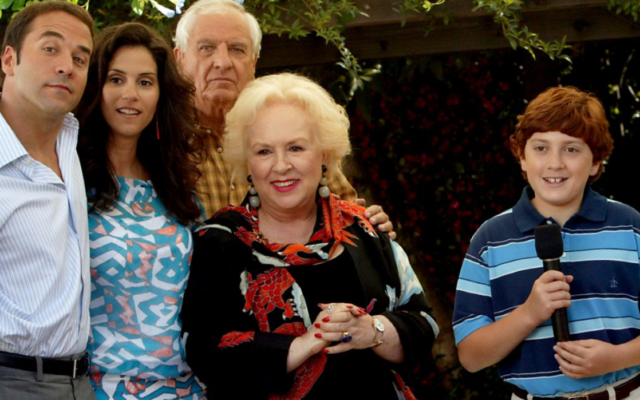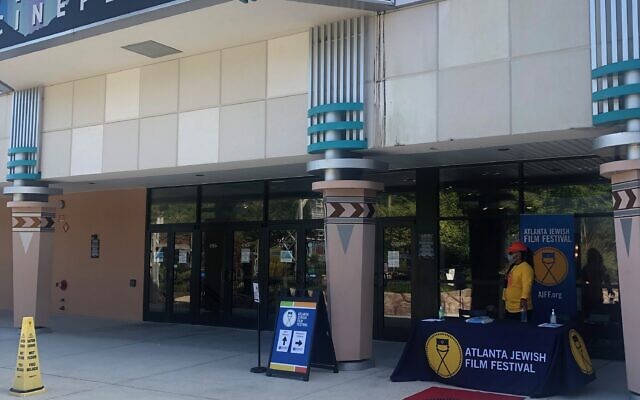AJFF Takes A Cautious Step Back To Theaters
The mini festival is an effort to gauge the public’s response to theater presentations.
The Atlanta Jewish Film Festival brought a mini-festival weekend of films to Roswell’s Aurora Cineplex on Aug. 28 and 29. The event, AJFF North was aimed at drawing in north metro residents in Alpharetta, Johns Creek, Roswell, and East Cobb. These residents have generally had to travel to Sandy Springs for the annual AJFF screenings.
For those who wanted to watch the films at the theater in Roswell, there were several health safety requirements.
Ticket buyers had to produce a record of their COVID-19 vaccination, which had to be done at least two weeks prior to the AJFF event. If there was no vaccination record, they had to bring a negative COVID test result, that had been done no longer than 72 hours before the screenings. Once inside the theater, everyone had to wear a blue wrist band issued by the festival. Face masks were required for AJFF employees and were encouraged, along with social distancing, for theater goers.

According to the festival’s longtime executive director, Kenny Blank, the rules were AJFF’s response to a rapidly changing pandemic. “I think we’ve all learned with COVID that we need to avoid wishful thinking and simply go where circumstances, the facts and the realities take us. Earlier this summer all of us, obviously, were very optimistic that the pandemic was starting to move into our rearview mirror. Clearly, that’s not the case, at least where we stand today.”
The program included a documentary, “The Meaning of Hitler,” straight from the Doc Aviv Film Festival in Tel Aviv, the recently released Hollywood drama, “Lansky,” and two independently produced films from previous years, “The Samuel Project” from 2018 and “The Yankles” from 2009.
According to AJFF workers at the theater, attendance was light. At a Sunday afternoon showing of the 2006 Hollywood classic, “Keeping Up With The Steins” there were many empty seats. Despite the lure of a filmed introduction from Hollywood by the movie’s director, Scott Marshall, less than two dozen patrons were in the theater.
Still, the mini festival was a chance to gauge how audiences might respond to the gradual reopening of theaters during the next AJFF, that Blank is beginning to plan for early in 2022. “This is really a first opportunity to welcome audiences back to the theater. We know it’s going to be a gradual process to return to movie theaters. But we want to make that available for those audiences who feel protected and are ready to get back out. We know the realities of the situation,” said Blank.
With COVID virus infection rates, and hospitalization rising in the Atlanta area, most who watched the AJFF mini festival, did so online. Two programs of short films could only be viewed virtually.
For now, there seemed even less interest in a theater experience than last February when the AJFF staged its annual festival, when only a few films were available in a drive-in theater setting.
That’s in line with trends that are rapidly reshaping the future of movies. According to a study released at the end of last year by Deloitte, the international business consulting firm, Americans in recent years, even before the pandemic, have stayed at home to be entertained.

Because of that, the industry is trending toward developing even more extensive streaming services, particularly for those entertainment providers with deep pockets. Companies like Disney, HBO, Amazon, Paramount and Netflix have ambitious plans to shift films they produce away from theater showings to online platforms they control.
The study pointed out that with the future of the pandemic so uncertain, it’s still too soon to know how much of our future entertainment will come to us directly at home and how much we will want to experience in theaters.
According to Blank, as the AJFF plans for its next festival in early 2022, they could face some difficult choices. “We’ve had to completely reinvent ourselves in response to the pandemic. Now, I think people are trying to figure out what that balance is, to what extent are they ready to get back to the movies, and also still have the flexibility of consuming the films in the virtual cinema.”
- News
- Local
- Bob Bahr
- Atlanta Jewish Film Festival
- Aurora Cineplex
- Alpharetta
- John's Creek
- Roswell
- east cobb
- Sandy Springs
- health safety
- COVID-19 vaccination
- COVID-19
- negative COVID test result
- Face masks
- social distancing
- Kenny Blank
- COVID
- documentary
- Deloitte
- films
- Doc Aviv Film Festival
- tel aviv
- Hollywood
- Scott Marshall
- mini festival
- Festival
- pandemic
- Disney
- HBO
- Amazon
- Paramount
- Netflix
- virtual cinema
- Arts




comments